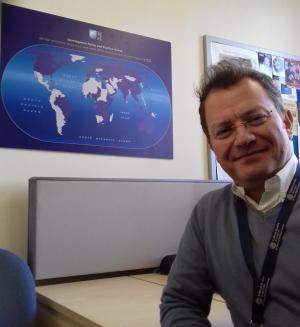You are here
- Home
- OU's Professor Theo Papaioannou appointed Director of Innogen Institute
OU's Professor Theo Papaioannou appointed Director of Innogen Institute
3 October 2018

Professor Theo Papaioannou is the new Director of the Innogen Institute, The Open University–University of Edinburgh centre for research on the social, political and economic implications of emerging technologies.
Professor Papaioannou is the first OU-based Director since Innogen was re-constituted as an Institute in 2014, after its ESRC funding ended.
Innogen was formed in 2002 to examine the impact of the new science of genomics and received some £7 million of ESRC funding over 12 years, alongside £14 million external funding.
Professor Papaioannou, who will be at the helm alongside Innogen co-director Dr Geoff Banda of Edinburgh and an OU–Edinburgh management team, says his objectives include increasing Innogen’s engagement with policymakers, and building up its external funding base.
The collaboration between the two institutions is the key to success, he says. “The University of Edinburgh has been very successful with Scottish funders and policymakers; here, we approach funders interested in the impact of emerging innovative technologies in international development.
“My role is to promote the collaboration and to make it more sustainable in terms of growing the research, and the funding for new research.”
Increasing Innogen’s engagement with policymakers will be made easier by its already well-established reputation, he says. “We’ve been around a number of years, we’ve contributed evidence to Parliament and we’ve published over 900 articles. Innogen is taken very seriously by policy people.”
Innogen’s interests have long expanded beyond genomics to encompass a range of life sciences and other emerging technologies, and this process will continue, with Professor Papaioannou ‘very optimistic’ about the potential of new fields of research emerging, such as automation and Artificial Intelligence.
“We are doing some substantial work around standards in these new technologies – how can they be standardised? how can we make sure there is a positive outcome, for economic growth but also for social welfare?”
To publicise its latest research Innogen is planning a major event on industrial strategy and innovation, which will coincide with the OU’s 50th anniversary celebrations next spring, and is aimed squarely at engaging policymakers and politicians.
Other themes that will occupy Professor Papaioannou are how to ensure Innogen’s research findings are translated into teaching for students, and how to maintain a research focus on inclusive innovation and ways in which new technologies can be shaped to reduce global inequality.
“In Development, Policy and Practice, especially, we think about the impact of new technologies in developing countries, and the importance of the inclusive nature of these technologies.
“We are trying to put forward this normative dimension that one of the purposes of new technologies should be to reduce global inequalities; new technologies should not a privilege of the rich.”
The strategic importance of Innogen, to the School that hosts it and to the Faculty of Arts and Social Sciences (FASS) as a whole, is greater than ever, he says. “Innogen now has a very clear development and global dimension, which strategically sends out the message that our teaching and research is focused on global issues. In the Brexit era, we look beyond the UK.”
Share this page:
Monthly Archive
- March 2024 (1)
- November 2023 (1)
- February 2023 (1)
- January 2023 (1)
- November 2022 (1)
- October 2022 (1)
Contact us
To find out more about our work, or to discuss a potential project, please contact:
International Development Research Office
Faculty of Arts and Social Sciences
The Open University
Walton Hall
Milton Keynes
MK7 6AA
United Kingdom
T: +44 (0)1908 858502
E: international-development-research@open.ac.uk
.jpg)